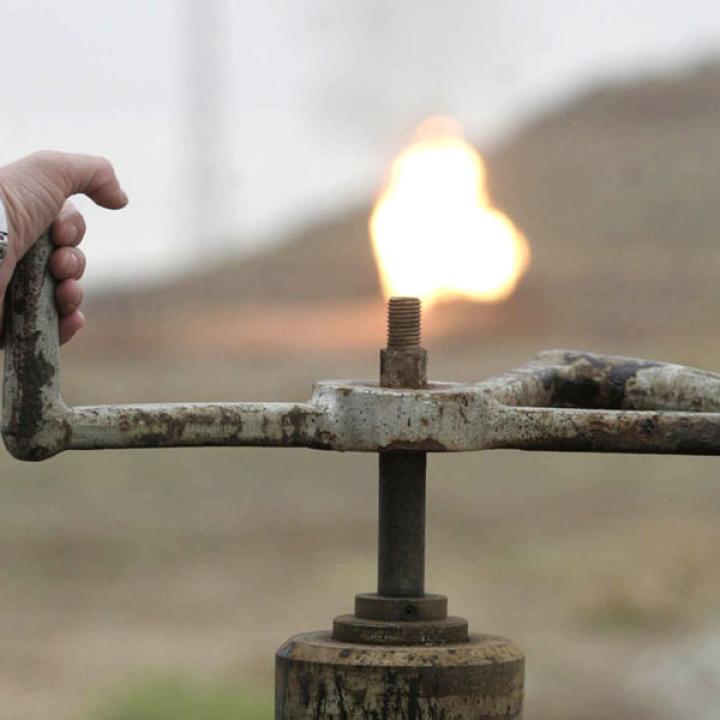
- Policy Analysis
- Fikra Forum
KRG Oil and the Slipping Dream of Financial Independence

Following the ICC's decision, the KRG has limited options in its fight for financial independence from Baghdad.
In 2014, the Kurdistan Regional Government (KRG) began to send its crude oil to the world market via Turkey’s Ceyhan port and the Iraq-Turkish pipeline, despite Baghdad’s protests. Seven years later, the International Criminal Court (ICC) issued a ruling on March 25 that this trade was a violation of the 1973 agreement.
While Baghdad and Erbil subsequently came to a new and long-awaited agreement over revenue sharing, the reality of this agreement’s contours is that the KRG has lost much of the financial independence that it had carved out for itself through the original deal with Turkey.
The KRG’s response came out of a quick series of events. Turkey’s response to the ICC ruling was immediate; it informed Iraq that Ankara would no longer allow KRG crude oil to be loaded onto ships at Ceyhan port without permission from Baghdad.
In response, oil firms operating in the Kurdistan Region stopped production or reduced output, diverting their remaining output into already mostly-full storage.
The KRG has about 57 oil blocks in thirteen of its oil fields, with one active block. The general capacity of production was 158,310,152 barrels in 2022, producing 433,726 bpd. Based on the oil exports of 2022, the general financial damage due to the shutdown was estimated to amount to more than 34 million US dollars.
Oil has been the main source of income for KRG, particularly in terms of paying the monthly salary of its employees. The two are deeply linked; KRG export of oil to Turkey coincided with the 2014 announcement of financial independence from Baghdad.
For its part, Baghdad has rejected KRG oil trade to Turkey from the beginning, sparking the initial ICC case. At that time, former Iraqi Oil minister Hussian Shehrstani said, “any oil exportation should be via the federally-owned State Oil Marketing Organization (SOMO) and any step outside of SOMO is illegal.”
In 2014, Nouri al-Maliki, the former prime minister of Iraq, asked the KRG to export 100,000 bpd via SOMO, with Baghdad sending the KRG its allocation of the revenues, but the KRG refused. The Central Government of Baghdad subsequently cut off the KRG’s budget. During his term as Iraqi Prime minister, Haidar al-Abadi likewise asked the KRG to export 250,000 bpd via SOMO, but KRG again refused. Then, Mustafa al-Kadhimi increased the rate to 400,000 bpd via SOMO, but KRG refused all of the requests, and has been exporting the oil through its pipelines instead.
Based on articles 115-112-111 of the Iraqi constitution, any oil exports should be conducted via SOMO, and this point has been included in the ICC decision on KRG oil export. So the real obstacle is the shipment of the oil, which has been indicated in the decision as a “violation” of the Iraqi constitution.
The financial pressure of losing its oil revenues—especially given the almost full oil reserves and deep KRG reliance on these revenues for income—pushed the KRG to accept Baghdad’s conditions. The KRG has now agreed to sell its oil via Baghdad and refrain from marketing it independently.
KRG oil will be exported via Baghdad without the authority of KRG. The KRG will get the deputy position in SOMO, and the income of the oil after being sold will be put in a bank account owned jointly by SOMO and the KRG. This represents a major concession for the KRG and a shift in the relations between the two entities, and has been a request from previous governments in Baghdad for years.
In the Kurdish revolutions, the repeated Kurdish saying was “the mountains are our backs.” In modern Kurdish history, the Kurds depend on the West, particularly the United States, to support its semi-autonomous status. At this key juncture, however, Kurdish allies appeared to acquiesce to this further rupture of the Kurdish dream of autonomy. A U.S. Department of State spokesperson on Monday told Rudaw Media Network that “it had urged Ankara and Baghdad to allow the resumption of the Kurdistan Region’s exportation of oil through Turkey,” but the mention of independence in exporting was lacking.
In the past, the KRG had found ways to rebuff Baghdad’s pressure against its financial independence. This time, however, international pressure or acquiescence appears to have closed all doors on this key aspect of Iraqi Kurdish autonomy: the financial independence of the KRG from Baghdad.



